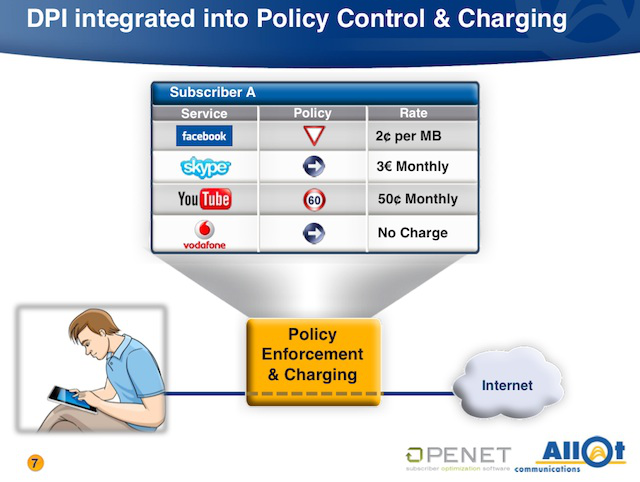What happens when a major mobile operator gets tired of people ditching voice calls and text messages for cheaper Skype calls and instant messaging? It just blocks those services and charges a monthly fee to access them.
It has long been clear that Internet providers, especially in mobile, would much prefer offering pay TV-style "packages" or services rather than one-price access to an Internet data pipe. "Want access to Facebook? Ah, that's part of our 'premium gold' plan."
Hardware makers have long enabled the dream, hoping to sell more of the deep packet inspection (DPI) gear that can analyze user traffic and slot it into various silos and service offerings. Last year, for instance, we reported on a presentation from DPI company Allot in which it showed how a subscriber could be charged 2¢ per megabyte to access Facebook, a couple bucks a month to access Skype, or 50¢ a month for 60 minutes of YouTube videos.

Dominant Dutch wireline and mobile provider KPN, which offers services across Western Europe, has taken the idea to heart. The company has just announced plans to charge mobile phone users separate fees for using voice-over-IP (VoIP) services like Skype, instant messaging programs, and streaming video. Specific new rate plans haven't yet been announced.
"Services such as browsing, using mobile VoIP, instant messaging and watching videos will get their own price tag, just as it is now with calling and sending an SMS," a company spokesperson told Dutch site Tweakers.net. The story has been widely covered this week in the Dutch-language press, with KPN being unusually direct about what it's doing and why.
With SMS and voice calls declining, KPN has decided that differential rates for Internet services will help it maintain current revenue levels. Dutch regulator OPTA has already said publicly that it's fine with the move, so long as KPN is transparent about how it charges. In fact, an OPTA spokesperson said she would "cheer such a development," since it provides more choice for consumers to put together a subscription package that meets their needs.
KPN used to be the dominant state telecom; it was privatized in the 1980s when Neelie Kroes was a Dutch telecoms minister. Kroes now serves on the European Commission and is responsible for net neutrality; she said in a speech this week:
At the end of 2011, I will present the findings and will publicly name operators engaging in doubtful practices. I will be looking particularly closely for any instances of unannounced blocking or throttling of certain types of traffic, and any misleading advertising of broadband speeds. If I am not satisfied that consumers can counteract such practices by switching providers, I will not hesitate to introduce more stringent measures
Mark my words: if measures to enhance competition are not enough to bring Internet providers to offer real consumer choice, I am ready to prohibit the blocking of lawful services or applications. It's not OK for Skype and other such services to be throttled. That is anti-competitive.
Those sound like tough words, but Europe has long suggested that differential pricing and paid prioritization will be allowed, so long as services are not simply blocked outright and so long as everything is transparent. Competition in Europe is supposed to reduce any anti-consumer effects of such moves.
The odd thing about differential pricing is that KPN is essentially charging for access to services it doesn't even control. It's still an open question who has more leverage here, the ISPs or the content providers; companies like Skype and YouTube could probably end such behavior by simply cutting off access for all KPN customers, causing a torches-and-pitchforks march on KPN headquarters.
reader comments
86